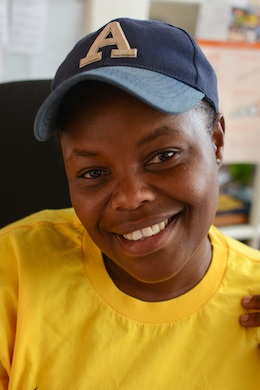Editor’s Note: The following blog post comes from Bukie Mfinci, a member of the Grassroot Soccer South Africa team. Bukie is currently an administrative assistant in our Cape Town office; she previously served as a GRS Caring Coach for two years. Here she gives us a first-person account of how she’s seen soccer (football) have a positive impact in her community, particularly on girls and young women.
 I remember the first time I was able to play football with boys when I was nine years old in Johannesburg, South Africa. In addition to the challenges of a young girl wanting to play football with a group of boys, as a Xhosa girl, it was difficult to communicate with the Sotho boys. In the village, I realised at a very young age that if we ever want to truly play football together, we would have to learn each other’s languages. Football allowed us to connect and see past our cultural differences, and this lesson has stuck with me throughout my life.
I remember the first time I was able to play football with boys when I was nine years old in Johannesburg, South Africa. In addition to the challenges of a young girl wanting to play football with a group of boys, as a Xhosa girl, it was difficult to communicate with the Sotho boys. In the village, I realised at a very young age that if we ever want to truly play football together, we would have to learn each other’s languages. Football allowed us to connect and see past our cultural differences, and this lesson has stuck with me throughout my life.
My past experiences have demonstrated to me that football is a powerful language that can be used to unite people from diverse cultural backgrounds.
As a Grassroot Soccer SKILLZ Coach from 2012-2014, I used the power of football to educate and mobilise young people in Cape Town’s largest township, Khayelitsha, about HIV/AIDS and gender equality. Football and sport-based activities allowed me to touch the lives of youth in Khayelitsha, regardless of their culture, gender or sexual orientation.
My role as a coach extended far beyond the pitch, though. I worked closely with young girls, many of whom have experienced domestic and gender-based violence, to speak up for themselves and understand their rights. I talked to them about the risks and stigma associated with HIV/AIDS using the universal language of football.
At Grassroot Soccer, we work as a team to break the many barriers and stereotypes that women and girls cannot play football, and we encourage everyone to play. When these girls and young women play football, it increases their physical health, self-esteem and confidence. This leads to better attendance and performance in school, and delayed sexual debut.
Football, and all physical sport and play, is so important to young girls in my community who don’t have safe spaces for recreation or otherwise, and the area in which the Grassroot Soccer FIFA Football for Hope Centre is located in Khayelitsha has an important history. Some 17 years ago, this particular section of Khayelitsha – Harare – was infamous as a dangerous place where muggings, murder and rape were common. No one from the community would go there. With the development of the Violence Prevention through Urban Upgrading (VPUU) Centre, and the construction of the Grassroot Soccer Football for Hope Centre, we have been part of a complete redesign of the Harare area. We have taken back control of this public area, and turned it into a safe space in Khayelitsha where girls and young women can come together, play football, support each other and feel protected. This centre, and the work we are doing, also demonstrates to the community where I live that girls and young women can play football.
Many young women around the world, and even in other parts of South Africa, don’t have the same opportunity to play football. We all know that being female can limit our access to many sport activities, especially football. However, we can stand up to harmful gender norms and stereotypes that girls and young women can’t play football.
As a Grassroot Soccer SKILLZ Coach, I challenged these harmful gender norms every day. I am still a role model for the many school-age girls I supported while a Coach, and I am also a role model today for current SKILLZ Coaches who can see how I am continuing my professional development.
I believe all young women and girls should have access to safe spaces for play and sports, and as a young activist in South Africa, I am trying to encourage young girls to play sports and live healthy lives.
Today, I am still working with Grassroot Soccer and hope to become a Community Programme Coordinator (CPC) at the Khayelitsha Football for Hope Centre, further developing my passion for football and Sport for Social Change.
Editor’s Note: Here’s a great example of Bukie engaging her neighbors in change: